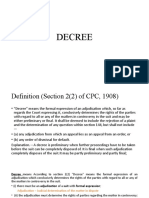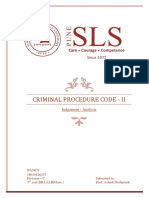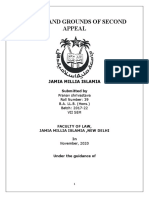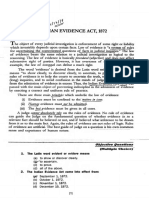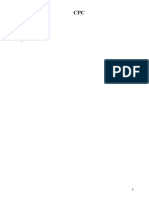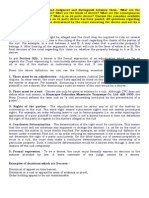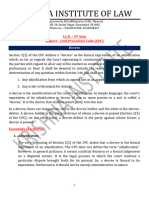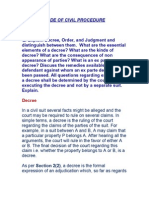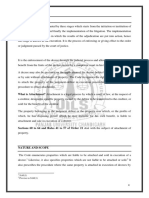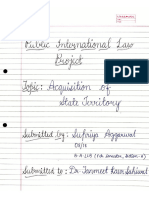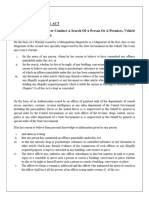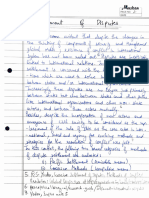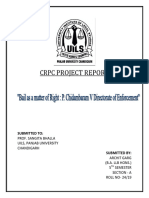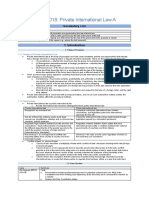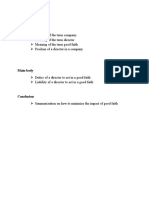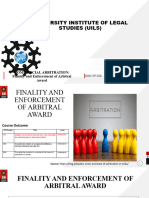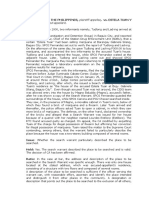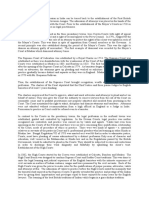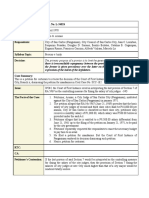CODE OF CIVIL PROCEDURE
DECREE
What is Decree?
A decree is a document prepared by the court at the end of a civil suit after judgment has been passed. It is
signed by the judge and bears the seal of the court. A decree is likely to be prepared within 15 days of the
judgment being issued. In general, the proceedings of a civil suit conclude when the court renders judgment
in a specific matter.
The requirement for a court decision to become a decree is that there must have been adjudication in a civil
suit, and such adjudication must have determined the rights of parties with regard to all or any of the
matters in controversy in the suit, and such a determination must be of a conclusive nature.
Furthermore, Section 2(2) of the CPC goes on to provide a short explanation of the term “decree”. It states
that a decree is preliminary when further proceedings have to be taken before the suit can be completely
disposed of. It is final when such adjudication completely disposes of the suit. It may be partly preliminary
and partly final.
Essentials of a decree
A bare reading of Section 2(2) of the CPC clarifies that a decree has the following essentials. It has been
further restated in the case of Vidyacharan Shukla v. Khubchand Baghel (1964).
1. Adjudication
The very beginning of Section 2(2) of the CPC states that a decree is the formal expression of an
adjudication. The CPC does not define the term “adjudication.” However, in general parlance, it means a
judicial decision or a formal judgement on a disputed matter. It is the legal process in which the court
resolves a particular dispute brought forth for its perusal. So, a decree is formal in its expression;
furthermore, it should not be merely administrative in nature.
In the case of Madan Naik v. Hansubala Devi (1983), the Supreme Court held that only those decisions that
are judicially determined can be recognized as a decree. Furthermore, in the case of Deep Chand v. Land
Acquisition Officer (1994), it was held that a decree can proceed only from an officer of the court.
2. Suit
Section 2(2) of the CPC provides that a decree must be in a suit. In other words, a decree arises only when
a suit is instituted. Though the CPC does not explicitly elucidate the term “suit”, generally, a suit under the
CPC is a civil proceeding instituted by the presentation of a plaint (Section 26(1) of the CPC). It is
instituted to enforce the civil rights of parties.
3. Determination of the parties’ rights
In a civil suit, there are two parties- the plaintiff (the person who institutes a suit) and the defendant (the
person against whom a suit is instituted). It is instituted only when the plaintiff feels that his civil rights are
being infringed upon by the defendant.
Further, it is pertinent to note that, as per the Supreme Court’s decision in the case of Dattatraya v.
Radhabai (1997), the substantive rights, not the procedural rights, of the parties are determined in a civil
suit. So, under Section 2(2) of the CPC, a decree is passed only when there is a civil suit in which the rights
of the parties are disputed.
4. Conclusive determination
Section 2(2) of the CPC provides that a decree should be conclusive in nature. It should conclusively
decide the rights and duties of the parties in such a way that the judge has nothing further to decide on. For
this very reason, provisional decisions like interlocutory orders do not fall under the ambit of “decree”
Divine Institute for Judicial Services: SCO 209, 1st floor, Sector-36 D, Chandigarh |Call 70878-78746
�under the CPC. Similarly, an order partly deciding on and partly remitting some issues to the trial court for
determination is also not a decree.
5. Formal expression
Section 2(2) of the CPC requires that a decree must be the formal expression of an adjudication. It means
that every decree is manifested in the form of writing, complying with the laws relevant to the particular
case. So, the informal comments of the judges during the course of the judgement (obiter dicta) are not
considered a decree.
A decree must be drawn separately and conclusively; in no case can the parties appeal any judgement if the
decree is not formally expressed.
What does a decree include
Section 2(2) of the CPC provides the following aspects that fall under the ambit of the term “decree”:
(I) Rejection of a plaint
When a plaint reaches the court, the court first determines whether it needs to be tried, returned, or rejected.
The court regards the material facts of the particular case and the provisions under Order 7 Rule 11 of the
CPC to determine it. Order 7 Rule 11 of the CPC states the scenarios when a plaint shall be rejected. A
plaint can be rejected by the court if:
- It does not disclose any cause of action;
- The relief claimed is undervalued by the plaintiff, and he/ she failed to correct it within the time stipulated
by the court;
- The plaintiff has failed to furnish the appropriate stamp paper within the time stipulated by the court after
the court returned it due to the usage of insufficiently stamped paper;
- The statement in the plaint shows that the suit is barred by any law;
- The duplicate copy of the plaint is not filed, or
- The provisions of Order 7 Rule 9 were not adequately complied with by the plaintiff.
Order 7 Rule 12 of the CPC provides that while rejecting a plaint, the judge should record the reasons for
such rejection in the form of an order. Section 2(2) of the CPC states that an order made by the judge under
Order 7 Rule 12 of the CPC is also a decree.
(II) Determination of any question under Section 144 of the CPC
Section 144 of the CPC deals with the doctrine of restitution. Restitution refers to the duty imposed on a
party to a suit who received a benefit from a decision of the court to return such a benefit to the other party
when the decision is reversed. Section 2(2) of the CPC provides that the determination of any question
under Section 144 of the CPC is also a decree.
What is not included in a decree
Also, Section 2(2) of the CPC provides that the following aspects are not included within the meaning of
“decree”;
(I) Any adjudication from which an appeal lies-
No adjudication which is appealed as an appeal from an order is a decree under Section 2(2) of the CPC.
(II) Any order of dismissal for default
No order of dismissal of a suit on the ground of the parties’ default is a decree. Examples of parties’ default
are failure to appear when the suit is called for a hearing and failure to pay adequate court fees or postal
charges. Order 9 of the CPC deals with such dismissal orders.
Divine Institute for Judicial Services: SCO 209, 1st floor, Sector-36 D, Chandigarh |Call 70878-78746
�Types of decrees-
Generally, there are 3 classes of decrees, as explained below:
Final decree
Section 2(2) states that a decree may be final. A final decree is one which wholly disposes of a suit and
finally settles all disputed matters in the suit. It is issued when all the hearings of a suit are complete and
there is nothing more to decide upon.
As held by the Apex Court in the case of Shankar Balwant Lokhande (deceased) v. Chandrakant Shankar
Lokhande (1995), a decree is said to be final in the following scenarios:
- When the decree is not appealed within the stipulated time;
- When the decree is passed by the Apex Court, that is, the Supreme Court, and
- When the court regards the decree as having been completely disposed of.
The following are characteristics of a final decree:
- It is executable;
- It may be passed without any preliminary decree;
- It conclusively settles the disputed matter, and
- The Court may pass more than one final decree.
Preliminary decree
Section 2(2) states that a decree may be preliminary. Let us recall what Section 2(2) of the CPC says about
a preliminary decree. The said Section states that a decree is preliminary when further proceedings have to
be taken before the suit can be completely disposed of. It is final when such an adjudication completely
disposes of the suit. So a preliminary decree is passed when there is still something that the court needs to
decide upon before conclusively determining the rights and duties of the parties. There may be more than
one preliminary decree in a suit.
As held by the Supreme Court in the case of Mool Chand and Ors v. Dy. Director Consolidation (1995),
the court passes a preliminary decree when, though the rights of the parties are figured out, a few other
matters are still pending to be decided upon. One must note that a preliminary decree does not completely
dispose of the suit; it leaves the suit pending before the court until the final decree is passed.
Under the CPC, a preliminary decree may be passed in the following types of suits:
1. Administration suits (Order Rule 13)
2. Suits for possession and Mesne profit (Order 20 Rule 12)
3. Partnership dissolution suits (Order 20 Rule 15)
4. Suit for partition and separate possession (Order 20 Rule18)
5. Suit regarding the sale of mortgaged property (Order 34 Rule 4)
6. Suits regarding accounts between the principal and agent (Order 20 Rule 16)
7. Suits regarding foreclosure of a mortgage (Order 34 Rule 2)
8. Mortgage redemption suits (Order 34 Rule 7)
9. Partly preliminary and partly final decree
Sometimes, depending upon the nature of the suit, the court may pass a partly preliminary and partly final
decree. Such a decree may contain parts that are final, while the majority of the decree may still be
preliminary.
Divine Institute for Judicial Services: SCO 209, 1st floor, Sector-36 D, Chandigarh |Call 70878-78746
�For instance, in a suit relating to inheritance, the court may pass a partly preliminary and partly final
decree, in which the determination of whether or not a particular party is entitled to receive a share in the
property may be final in nature; whereas the determination of who will receive what share in the property is
a part of the preliminary decree. A preliminary decree can be passed by the court in the following suits as
provided by the Code of Civil Procedure, 1908
Order 20 Rule 12: Suit for possession and Mesne profit
When there is a suit related to possession of immovable property or for rent or mesne profit then in such
cases preliminary decree can be passed.
Order 20 Rule 13: Administration Suits
When a suit is of the nature of administration suit, then a court is empowered to pass a preliminary decree.
Order 20 Rule 14: Suits of pre-emption
When there is a suit for claiming pre-emption regarding sale or purchase of a particular property then the
court can pass a preliminary decree.
Order 20 Rule 15: Suit filed for dissolution of a partnership
When there is a suit for dissolution of the partnership or for the partnership account to be taken, then the
court may pass a preliminary decree.
Order 20 Rule 16: Suits related to accounts between the principal and agent
In a suit related to the pecuniary transaction between the principal and agent or any other matter, if
required, the court may pass a preliminary decree.
Order 20 Rule 18: Suit for partition and separate possession
When the suit is related to partition or for separate possession of share then the court may pass a
preliminary decree.
Order 34 Rule 2: Suits related to the foreclosure of a mortgage
When there is a suit related to the foreclosure of mortgage then under Rule 2 of Order 34, a court is
empowered to pass a preliminary decree.
Order 34 Rule 4: Suits related to the sale of the mortgaged property
In suits related to the sale of the mortgaged property, the court is empowered under Rule 4 of order 34 to
pass a preliminary decree.
Order 34 Rule 7: Suits for the redemption of a mortgage
When a suit is filed before the court regarding the matter of redemption of the mortgaged property, the
court is empowered under Rule 7 of Order 34 to pass a preliminary decree.
Decisions considered as a decree
The decisions held to be decree are as follows:
- Order of abetment of suit
- Dismissal of appeal as time-barred;
- Dismissal of suit or appeal due to the requirement of evidence or proof;
- Rejection of plant due to non-payment of court fees;
- Order granting costs and instalments;
- An order refusing costs or instalments;
- An order refusing maintainability of appeal;
Divine Institute for Judicial Services: SCO 209, 1st floor, Sector-36 D, Chandigarh |Call 70878-78746
�-Order denying the survival of right to sue;
- Order stating that there is no cause of action;
- An order refusing to grant one or several reliefs;
Decisions not considered as a decree
- The decisions which are not considered as a decree are as follows:
- Dismissal of appeal for default;
- Appointment of Commissioner in order to take accounts;
- Order for remand;
- Order granting interim relief;
- An order refusing the grant of interim relief;
- Rejection of plaint in order to present it to the proper court;
- Application rejected for condonation of delay;
- Order holding an application to be maintainable;
- Order of refusal to set aside the sale;
- The order issuing directions for the assessment of mesne profit.
Can there be more than one preliminary decree?
There is a conflict of opinion regarding this question that whether there can be more than one preliminary
decree in the same suit or not. Some High Courts are of the view that there can be more than one
preliminary decree while some of the High Courts are against this view.
The Supreme Court in the case of Phoolchand v. Gopal Lal, held that nothing in the Code of Civil
Procedure prohibits passing of more than one preliminary decree if the circumstance requires or if required
by the Court. But, it should be noted that this decision was given by the Court regarding partition suits.
Conclusion
The Code of Civil Procedure lays down provisions to pronounce and issue the decision of the Court and
decree is one of them. A decree in the decision of a court which determines the rights in dispute between
the parties to suit. A decree can be preliminary, final or partly preliminary and partly final. There is also a
concept of the deemed decree. A decree is different from order and judgment in many ways.
For the execution of decree Order XXI of the Code lays down the provisions and procedure. A decree is
appealable and even second appeal lies to High Court after the first appeal of a decree. A decree is passed
only in civil suits and not in criminal matters.
For more FREE Notes message here..
Divine Institute for Judicial Services, Chandigarh
Why should you join ‘us’?
Divine Institute for Judicial Services: SCO 209, 1st floor, Sector-36 D, Chandigarh |Call 70878-78746
� •Top most faculty members of Northern India (including vice chancellor of NALSAR, EX HOD of law
dept.)
• Tue - Sun classes (Monday off)
• 3 Classes a day (1.5hours each)
• Major and minor laws coverage
• Latest judgements class on every weekend
• Language classes (Hindi, English, Punjabi)
•Gk & current affairs class
• Doubt sessions
• Confined study material curated by law research team
• Special focus on answer writing
• Smart classrooms (live streaming of physical class (students can check recordings of online &
offlineclass)
• Special late evening batch for Pursuing student
Free Semester Guidance for Pursuing student
• Small size batch (50-55 students)
• Interview preparation included
• Regular weekly tests
• Hostel/PG facility
• Special discounts on early Registration
Registration open for Jan-2024 & Feb-
2024
Morning batch timing:
9:00am-
2:00pm
Evening
batch
2:30pm-
7:00pm
(pursuing students can attend 4:30-7:00)
47 Students qualified in Punjab judiciary 2022-23
To attend free demo class scan here.
ANDROIDIOS
Divine Institute for Judicial Services: SCO 209, 1st floor, Sector-36 D, Chandigarh |Call 70878-78746

